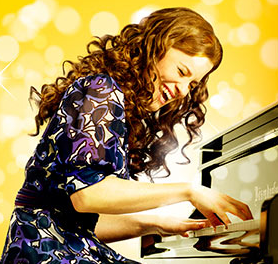Jukebox Musicals
Put a penny in for the jukebox musicals

Recently London has been awash with so called Jukebox Musicals - where the score is already made up of pre-existing songs. Eva de Valk explores this latest phenomenon to hit London's West End.
Last month the West End welcomed a long-awaited new show: Beautiful, the Carole King Musical. It’s the latest edition in a series of productions that explore the lives of famous recording artists and, conveniently, come with a catalogue of already successful songs. In fact, at times it seems that every other new West End arrival is one of these so-called ‘jukebox musicals’, that cleverly use an artist’s name and fame to their advantage.
A jukebox musical is a musical with a score made up of pre-existing songs. These songs usually have a connecting feature; they can all be in the same genre for example. More often than not, however, the connection is that they’re by the same artist. The jukebox musical generally takes one of three forms. Option one is a tribute, a celebration of a genre or artist. The second possibility is a biographical show that tracks the life and career of the original singer or band. The final option is an entirely new story, fused together by a catalogue of greatest hits.
One look at the current options available on the West End makes it very clear: jukebox musicals are money makers. Although the genre has been around since the seventies, it was in the early noughties that it really took off with the enormous success of Mamma Mia! Currently seven examples of the genre grace the West End theatres. The previously mentioned ABBA hit musical is fast approaching its sixteenth birthday, but Jersey Boys, which has been around since 2008, is also doing a respectable stint. And let’s not forget We Will Rock You, which closed last year after twelve years on stage.
With these three examples we’ve reached an interesting question that anyone talking about this genre has to address: are jukebox musicals any good? Jersey Boys got rave reviews, the critical response to Mamma Mia! was decidedly mixed and We Will Rock You was pretty much uniformly panned by the critics. There certainly still clings a whiff of the problematic to the genre as a whole, the idea that for every Sunshine on Leith there’s at least five Viva Forever’s. It’s not an entirely unjustified notion either: by its very nature a jukebox musical can go wrong very easily. The tribute show and the biographical musical rely heavily on the possibility of casting leading actors with the same sound, appeal and preferably looks as the original artists. It takes a pretty strong cast to compete with Michael Jackson or the Beatles, and high expectations can quickly turn to disappointment, especially since the majority of the audience will be fans of the original artists.
The original story, meanwhile, is an entirely different struggle: how do you come up with a plausible and engaging plot that also incorporates a wide variety of hit numbers? ABBA gave Catherine Johnson a fairly coherent catalogue of love songs to work with in Mamma Mia!, but those who have seen We Will Rock You will know that not every jukebox musical is blessed with such a sensible story. In fact, the Guardian was of the opinion that the book’s only purpose was to ‘devise more unlikely ways to wring out another Queen song’, while the Daily Mirror suggested that ‘Ben Elton should be shot for this risible story’.
Yet, despite all the criticism, it can’t be denied that the public loves a good, and occasionally even a bad, jukebox musical. It’s easy to see why: of everything the theatre has to offer, this genre is easily the most accessible. There’s something immensely exciting about seeing your favourite songs performed live in a theatrical environment, where all the stops are pulled out. That goes doubly when a show offers a ‘second chance’ at seeing a legendary band like the Beatles that very few people today have seen live on stage. Biography musicals, moreover, have the added benefit of showing a glimpse of the people behind the well-known tunes. The greatest advantage, however, has to be the way these shows get the audience up on their feet, singing and swinging along to beloved classics. A good jukebox musical can do something that is both incredibly simple and horribly difficult: it can make an audience happy. And that’s a valuable quality indeed.